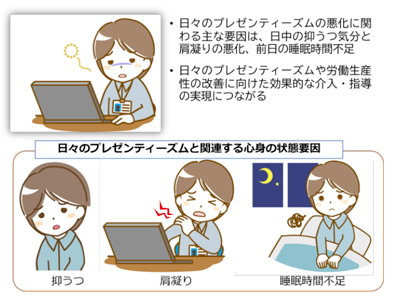Reading time: approx. 2 minutes and 31 seconds
June 28, 2024 AM 09:10
Traditional assessment methods make it difficult to assess daily changes and related mental and physical conditions.
On June 20, Osaka University found that worsening daily presenteeism (a condition in which workers come to work but their work efficiency is reduced due to some kind of health problem) is associated with depressive mood during the day and worsening shoulder stiffness. Lack of sleep the day before was associated with this. This research was conducted by a joint research group consisting of Toru Nakamura, a specially appointed professor at the University's Dataability Frontier Institute (full-time), Professor Yoshiharu Yamamoto from the University of Tokyo Graduate School of Education, and Kaori Sawa (PhD course). The research results are published online in the Journal of Occupation and Environmental Medicine.
Image from the release
(For more details, please check the relevant link ▼)
Presenteeism is said to lead to lower labor productivity for individuals and companies, and is said to cause greater economic losses than absenteeism. Therefore, countermeasures against worker absenteeism in the workplace have gained importance in recent years. However, attendance is complicated by a wide range of psychological, physiological and social factors, and in addition, attendance is difficult to assess objectively. Yes, it has not been fully proven yet.
Attendance is usually assessed using questionnaires over several weeks or months. However, this method has disadvantages such as low objectivity due to recall bias due to recall and low temporal resolution of the evaluation period. Therefore, it has been difficult to identify daily fluctuations and associated psychological, physiological and social factors.
A dedicated app was developed to answer subjective symptoms, and 56 health workers responded 5 times daily
This time, the research group conducted an environmental median assessment (EMA) of 56 healthy workers over two weeks using an independently developed smartphone app and a physical activity scale to determine daily changes in daily attendance and mental and physical conditions associated with attendance.
Participants were asked to answer five times a day about their subjective symptoms (depressed mood, anxiety, tension, fatigue, sleepiness, stiff shoulders, etc.) using a special application installed on their smartphone. In addition, at the end of each workday, participants were asked to answer a question about their attendance period: “How did you do at work today?” At the end of the study, attendance was assessed throughout the study using an existing questionnaire (WHO Health and Work Performance Questionnaire: WHO-HPQ) that is widely used internationally.
Key factors related to depressed mood during the day, stiff shoulders, amount of sleep the previous day, and changes in attendance
When we examined the association and intraclass correlation coefficient between daily attendance assessed by the WHO-HPQ and the EMA, we found that although there was a high association between the two, the agreement was low, especially when assessed by the EMA and changes such that a temporary worsening in attendance could be detected were confirmed. Furthermore, we examined the relationship between changes in daily attendance assessed by the EMA and daytime mental and physical conditions, and found that the main factors associated with changes in daytime depressive mood, shoulder stiffness, and sleep duration on the previous day became apparent.
Expectations of improved attendance through the use of technology such as just-in-time adaptive intervention
The research results suggest that interventions and guidelines such as reducing daytime depression and stiff shoulders and ensuring adequate sleep are effective in improving daily attendance. “The use of techniques such as timely adaptive intervention, which provides appropriate intervention at the right time for individuals, based on an understanding of the physical and mental conditions of daily life, has been attracting interest in the field of health informatics in recent years,” the research group said. “By doing so, it is expected that it will be possible to improve daily attendance and achieve behavioral changes that will lead to increased work productivity.”

“Travel maven. Beer expert. Subtly charming alcohol fan. Internet junkie. Avid bacon scholar.”







More Stories
The ranking of the best survival horror games selected by the IGN US editorial team has been released! Resident Evil RE:2 ranked first
Enjoy a hot cigarette while looking at whales and tropical fish under the sea ⁉︎ “Ploom Dive” is an amazing spatial video experience using Apple Vision Pro
Apple Watch now supports sleep apnea, watchOS 11 released – Impress Watch